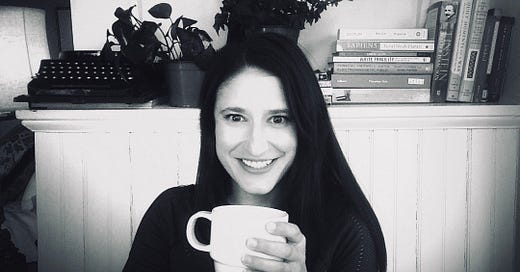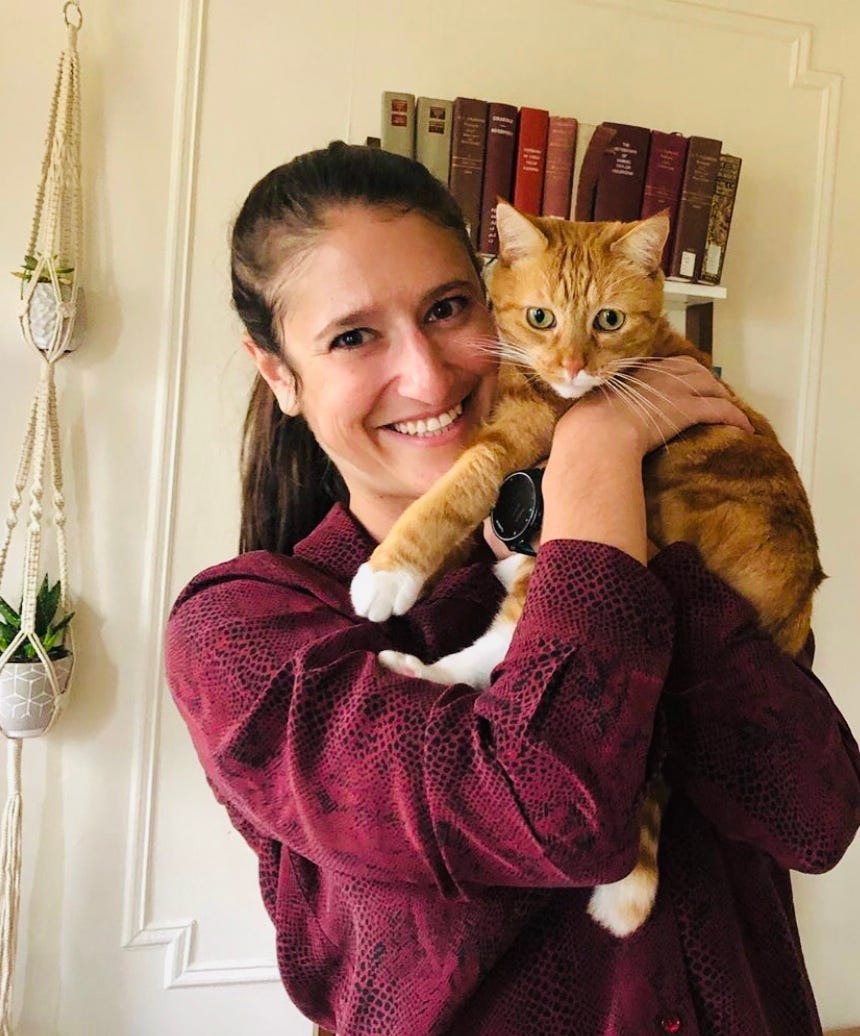Curiosity Is A Kind Of Love
The Body, Brain, and Books: Eleven Questions with writer and professor Jillian Hess
Welcome to another edition of The Body, Brain, & Books. If you enjoy reading these quick, insightful interviews brimming with wisdom and hope, please subscribe to Beyond!
is a professor of English at CUNY; author of How Romantics and Victorians Organize Information (Oxford University Press, 2022); and she writes the newsletter .What are you reading now?
I’m a rabbit-hole reader, by which I mean, I become obsessed with a topic and try to read everything I can about it. This works well with my newsletter, Noted. I pick a historical figure I want to spend a week with and then I walk to the Brooklyn Library and take out every single book I can find on my subject. This week, I’m focused on Franz Kafka—one of my all-time favorite authors. I’ve especially loved revisiting his diaries. I first read them in college, when the only available edition was edited by Kafka’s friend Max Brod. Understandably, Brod significantly sanitized Kafka’s entries. Recently, Ross Benjamin came out with a new edition of the diaries that reveals Kafka in all his messy, humanness. There’s more about his sexuality as well as some digs at Brod. And they include some delightful sketches!
In addition to writing Noted, I’m an English professor, so I’m reading a lot of student essays at the moment—and they are wonderful! For my writing classes, I ask students to pick topics they care about—so I get to learn so much from them. I teach them how to compose an essay and they teach me about something that matters to them. For example, one student researched new treatments for schizophrenia, a disorder that afflicts her brother. Another student wrote about social media tactics to spread environmentalist messages. They’ve been working on these topics all semester, and it’s so rewarding to see what they’ve come up with!
Finally—to nurture the love of reading I had before it became my job, I always read a bit of a fun novel every night before bed. I just finished Alice Feeney’s Daisy Darker. It’s an incredibly twisted family saga that lives up to the novel that inspired it: Agatha Christie’s And Then There Were None.
What are your most beloved books from your youth? Did you ever hide any from your parents?
You’re going to think I’m joking, but I’m not: my favorite book was the dictionary. I just wanted to know ALL the words! I remember keeping a small notebook where I wrote down unfamiliar words (there were a lot). I wish I could find that notebook now.
As a child, my favorite author was Shel Silverstein. I adore everything he wrote, but The Giving Tree remains my favorite. Here’s a picture of me, preparing to be a teacher by reading to my dolls:
What’s your favorite book to reread? Any that helped you through a dark time?
Books have been my salvation. Truly. Every dark time in my life has been accompanied by glimmers of light from literature. When the world has felt unsafe or unkind, I have always retreated to the literary world. And literature has not only welcomed me, but it has given me tools to handle whatever was going on in my life.
For example, the academic job market is notoriously brutal—it took me three years to finally get the job I have. During that time, I was reading (and re-reading) George Eliot’s Middlemarch which is infused with Eliot’s generous humanism. The things that matter most, it argues, are often the quiet, unrecognized commonplace deeds. It’s not about getting the most prestigious job or writing the most important book; it is about quiet acts we do that make other peoples’ lives a little better. The lesson I took from this was that while I couldn’t control the job-market, I could control my daily life and how I show up for other people.
I returned to Middlemarch in 2019 when I was finishing my academic book, How Romantics and Victorians Organize Information, while also ending a long, difficult relationship. Once again, George Eliot taught me to focus on the quiet, nearly invisible triumphs.
Last year, I read Carl Jung’s The Red Book for a Noted post. I’ve returned to this book monthly ever since. Jung wrote it during his mid-life crisis at around 40 (the age I am now). So much of this book is about getting at know oneself—going beyond the person we present to the world, and instead focusing on the person we are in our dreams, in our subconscious, when we are not trying to fit into the world around us. Here’s one of my favorite quotes from The Red Book:
Woe betide those who live by way of examples! Life is not with them. If you live according to an example, you thus live the life according to an example, but who should live your own life? So live yourselves.[1]
I just love this! Who will live your life if you don’t live it?
What’s an article of clothing that makes you feel most like you?
Either a blazer or running shorts. These used to be aspirational outfits. I really wanted to be a professor and a dedicated runner. I used to wear them as a kind of costume—a way to energize myself. Now, I’ve grown into those identities. I’m a professor and I run regularly (when not injured, that is). I suppose these items are less aspirational these days.
What’s the best piece of wisdom you've encountered recently?
The best predictor of success is how you deal with failure. Everyone fails. The more successful a person is, the more they’ve failed. It’s what you do after the failure that really matters.
Tell me about any special relationship you’ve had with an animal, domestic or wild?
My rescue cat, Cali. She’s cuddly and loving and the best companion a writer could ask for. I got her two years after leaving California, where I spent my 20s while getting my Ph.D. at Stanford. I missed the California sunshine, and my friendly, orange cat reminded me of her namesake.
What's one thing you are happy worked out differently than you expected?
My friendships. I was a loner as kid, so I never expected to have meaningful friendships. But it turns out, I just hadn’t found “my people” yet. Once I went to graduate school, I found so many like-minded book nerds. Many of them are now my closest friends in the world. And they make my life so much richer. I should add: I’m also so grateful for the real, deep friendships I’ve made with other writers on Substack.
Singing in the shower or dancing in the kitchen? Or another favorite way your body expresses itself?
Dancing in the kitchen for sure! And also dancing whenever I can! Running also often feels like dancing to me. It’s just moving my body to a rhythm.
What are your hopes for yourself?
I want to stay focused on my core values, which center on caring for people—my friends and family, my students, and my readers. Since writing on Substack, I’ve noticed how easy it is to become consumed by numbers (of subscribers, likes, comments…) so I try to remind myself that what I really care about is writing posts that might inspire someone or make them feel less alone in their pursuits. Those things are often invisible, but they are more important than “likes”.
What’s a kindness that changed your life?
I’ve been blessed with many brilliant, generous teachers. I don’t come from a family of academics, so the idea of becoming a professor felt very alien to me. I had a wonderful mentor in college who encouraged me to apply to Ph.D. programs. I definitely wouldn’t have applied without her encouragement. And my life would have turned out very differently.
I’d also like to acknowledge the generosity of so many readers on Substack—including you, Jane. I started writing Notedin November of 2022, with an immense fear of putting words on the internet. The community I’ve found here continues to amaze me with its kindness, generosity, and brilliance.
What’s a guiding force in your life?
Curiosity. I think curiosity is a kind of love, a state of profound interest in a topic of study, in a person, in a society, in an idea, in a book. Curiosity drives me to go deeper than I otherwise would and that results in more profound relationships and learning experiences.
[1] Jung, Carl G. The Red Book: A Reader’s Edition. W. W. Norton & Company, 2012, p. 125.
⭐️Beyond with Jane Ratcliffe is a reader-supported publication with the goal of bringing as much light as possible into this world of ours. If you look forward to reading Beyond, please consider becoming a paid subscriber.










I am so moved by Jillian's view of curiosity as a form of love that it brought me to tears. I am going to print it out and paste it to the shelf over my desk.
I am currently working on an essay about how to talk to someone with whom you disagree vehemently—how to bridge the gap—which proposes that what can work is for each to explore what is behind the other's position. That is, you can overcome your rage by activating your curiosity. It's been something of a mystery to me that I experience a surge of affection for my interlocutor, when we agree not to try to change one another's minds but only to focus on how we each came to our beliefs. Jillian's insight offers an answer!
Further, last week, my writing partner (a neuropsychiatrist) and I (an essay writer) started a substack in which we explore through dialogue how writers and others can benefit from new insights of neuroscience and psychology. One of the discoveries is how curiosity that is free of judgment can lead us to a deeper understanding of ourselves—even to personal transformation.
I have been following both you and Jillian for some time and love both your substacks. What a treat to read you in conversation!
I love her observation about handling failure as a predictor of success. And I guess the time has come to read Middlemarch.